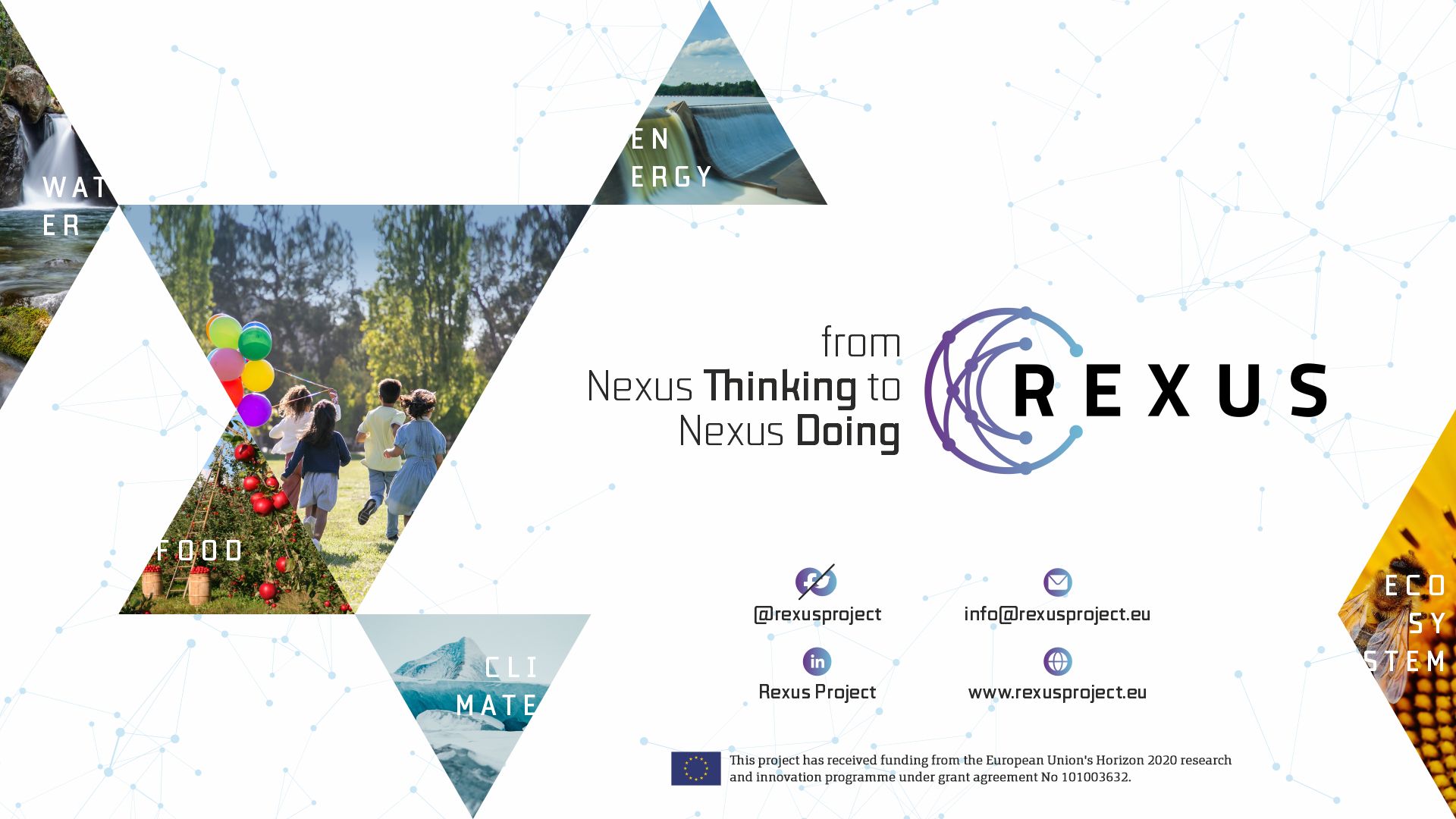Growing competition among different sectors for scarce natural resources presents an increasing challenge to the security of people, nature and the economy, highlighting the necessity of integrated approaches in natural resources management. While the Water-Energy-Food Nexus concept is gaining recognition for its capacity to deal with sectoral interdependencies, addressing trade-offs and facilitating synergies, its uptake in policymaking has been slow.
To address this gap, the Horizon 2020 REXUS project is developing a new blueprint for Nexus-oriented policymaking, through integration of state-of-the-art scientific modeling tools adapted to specific local conditions. With these tools, developed through participatory processes and allowing visualization of evolving WEF Nexus dynamics, REXUS is presenting stakeholders and policymakers with clear scenarios and actionable policy choices with the aim of ensuring long-run resource security in the face of climate change.

REXUS is funded by Horizon 2020, the EU’s financial instrument placing research at the heart of the EU’s blueprint for smart, sustainable and inclusive growth and jobs.
REXUS is being applied on the ground in 5 pilot areas: 2 catchments, in Greece (Pinios river basin) and Colombia (Nima river watershed), 2 transboundary river basins, Isonzo-Soča in Italy/Slovenia and Lower Danube in Romania/Bulgaria/Serbia, and the entire peninsular territory of Spain. Cross-sector stakeholder partnerships are being formed, which include high-level representatives of Ministries and planning agencies, research institutions, as well as end-users, most importantly farmers faced with resource scarcity and the impact of climate change.
Top-down and bottom-up approaches are being combined to tailor the REXUS approach to the specific needs of pilot areas, with stakeholder alliances taking an active role in co-developing, testing and applying the integration of methods: climate projections and climate risk assessments, energy, carbon and water accounting and footprints, land-use mapping and Earth observation based indicators will be brought together to analyse the local integrated Nexus system. Ecosystem-based adaptation measures will be tailored and evaluated on their capacity to address local challenges.
For the first time in Nexus analysis, REXUS will take into account feedback loops between sectors in coupled resource flow analysis for Water, Energy and Food sectors, contributing to breaking down sectoral silos not only in analysis, but also policymaking. This will be made possible through the use of Participatory Systems Dynamic Modelling, which is central to the REXUS approach. The results are expected to differ significantly compared to the linear relationship analysis, providing crucial new insights for future policy development.
Ultimately, the REXUS approach will achieve tangible impact by helping build relationships of trust among stakeholders, empowering them to tackle their region’s Nexus challenges with the use of robust data and visualization tools that provide new perspectives. By documenting and uncovering the common underlying drivers of pressures, it will elevate the debate beyond narrow sectoral conflicts, to create space and tools for the design and adoption of a longer-term strategic plan for resilience and resource security, in line with the Sustainable Development Goals.
REXUS is a Research and Innovation Action funded by the European Union's Horizon 2020 programme developed by a consortium of 17 partners from 7 different countries and coordinated by the University of Castilla-La Mancha, Spain.
Visit the Rexus website: www.rexusproject.eu and follow us on Social media: Linkedin, Facebook, Twitter.
The REXUS project has received funding from the European Union's Horizon 2020 research and innovation programme under grant agreement No 101003632. The project will run from 1 May 2021 to 30 April 2024.
THE REXUS CONSORTIUM
- University of Castilla-La Mancha (Spain)
- University of Cambridge, Cambridge Centre for Environment, Energy and Natural Resource Governance & Centre for Sustainable Development (UK)
- Draxis Environmental SA (Greece)
- IRSA Consiglio Nazionale Delle Ricerche (Italy)
- CIAT (Colombia)
- Deltares (Netherlands)
- UNIPD (UNIVERSITA DEGLI STUDI DI PADOVA) (Italy)
- Fundacion Circe (Italy)
- I-Catalist (Spain)
- ETIFOR SRL (Italy)
- Agrisat Iberia SL (Spain)
- AAWA - AUTORITA' DI BACINO DISTRETTUALE DELLE ALPI ORIENTALI (Italy)
- SWRI (Greece)
- GEOECOMAR (Romania)
- WWF Romania (Romania)
- Global Water Partnership – Mediterranean (GWP-Med) (Greece)
